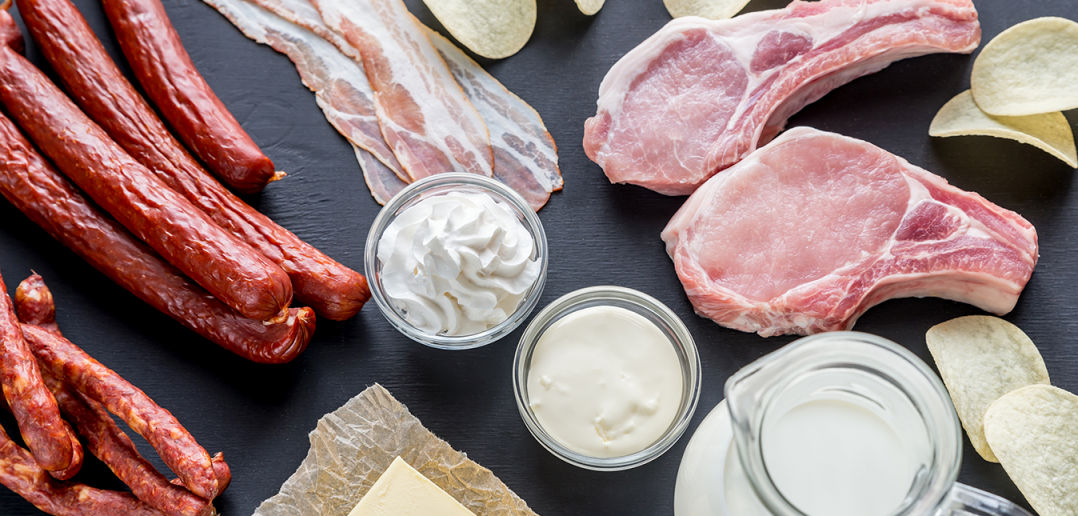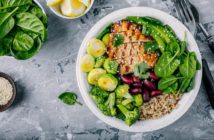Saturated fat has had us running scared for decades, with promises of hardened arteries, high cholesterol and expanding waistlines if we dare to indulge. This message is still alive and kicking, but is it really true?
It all started in the 1950’s thanks to a scientist named Ancel Benjamin Keys. He worked tirelessly, spreading the message that saturated fat causes high cholesterol and heart disease. This, combined with a sharp increase in heart disease at that time in America, meant that dietary guidelines changed accordingly, and the rest is history.
The trouble is, the original thinking and research was flawed in several ways, yet never questioned. Dozens of more recent studies over the decades have looked into the question of whether or not saturated fat causes heart disease, and almost without exception, the answer has been no (1, 2). One study even found saturated fat intake to be linked to reduce incidence of stroke (3).
What is saturated fat? All fats are made up of molecular chains of carbon, oxygen and hydrogen atoms. The term ‘saturated’ simply means this type of fat is saturated with hydrogen atoms, rather than mono-unsaturated and poly-unsaturated fats, which are less so. Within the classification of saturated fats, you will find long-chain, and medium chain fats depending on the length of the molecular chain.
Ancel Benjamin Keys worked tirelessly, spreading the message that saturated fat causes high cholesterol and heart disease
Examples of long-chain saturated fats include myristic, palmitic and stearic acid, found mainly in the milk and meat of cattle and sheep. This type of saturated fat makes up the majority of the fatty acids found in our cells, and they are burned efficiently and cleanly by the body for energy. They also bring other benefits such as helping to build healthy bones, reducing harmful lipoproteins, supporting the immune system, helping the body absorb fat-soluble nutrients such as vitamins A, E, K and D, and helping to protect the liver from alcohol- and medication-related damage.
Medium chain saturated fats are found in coconut milk and breast milk and are used quite differently by the body, in that are sent directly to the liver, giving a quick and easily-digestible source of energy. Medium chain saturated fats are also believed to promote a healthy metabolism, fat burning, support thyroid health, and encourage ketone formation – which may be beneficial for certain neurological conditions such as epilepsy and Alzheimer’s disease.
Lauric acid is the star ingredient in medium chain saturated fat, because it has antiviral, antibacterial and antioxidant properties. Coconut oil is ideal as a cooking fat, because it has a high smoke point meaning it is more stable and less prone to damage when heated.

Butter contains vitamin K2, butyrate (a short-chain fat that helps keep your colon healthy), and omega 3 fats
Despite saturated fats being been part of our diet for millions of years, and bringing a host of health benefits, we have been led to believe that man-made alternatives are better for us, like margarine instead of butter, but newer scientific evidence brings this into question.
Firstly, eating margarine increases our intake of omega 6 fats, and refined ones at that, which already tend to be overloaded in our diets and can increase risk of inflammatory diseases (4). Secondly, evidence suggests that the stanols and sterols within many cholesterol-lowering margarines may be bad for our health, and in fact a higher level of these substances in the bloodstream can even increase our risk of cardiovascular disease (5, 6). Butter, on the other hand, contains vitamin K2, butyrate (a short-chain fat that helps keep your colon healthy), and omega 3 fats.
So don’t be afraid to eat more natural saturated fat – your body will thank you for it. An easy way to start is by cooking with coconut oil, and including a tablespoon in any smoothies you make such as our Liver Detox Smoothie. Then think about including red meat two-three times per week, avoiding the lean cuts, plus choose chicken with skin – but do try to go for organic meat when you can, so the fat is as ‘clean’ and healthy as possible. Finally, choose butter over margarine, and eat plenty of eggs including the yolk.
References
- http://wholehealthsource.blogspot.co.uk/2011/01/does-dietary-saturated-fat-increase.html
- http://www.ncbi.nlm.nih.gov/pubmed/20071648?dopt=AbstractPlus
- http://www.ncbi.nlm.nih.gov/pubmed/20685950?dopt=AbstractPlus
- http://ajcn.nutrition.org/content/83/6/S1483.abstract
- http://www.ncbi.nlm.nih.gov/pubmed/1650421
- http://www.ncbi.nlm.nih.gov/pubmed/10758959




